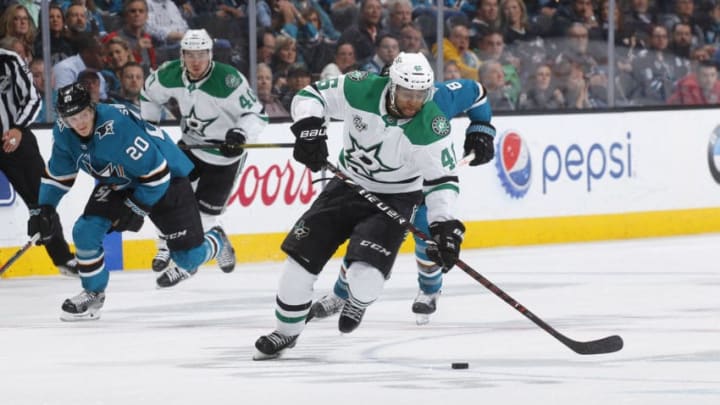The Dallas Stars are working on cutting down their roster before opening night, but they’re facing a tough decision when it comes to their forwards.
Roope Hintz had an outstanding season last year and he’s been fantastic so far this pre-season, but the Dallas Stars would need to shuffle some players around to make space for him.
The Stars are looking at a situation in which they have 15 forwards on one-way contracts and not enough roster spaces for all of them, let alone someone on a two-way ELC like Hintz.
Martin Hanzal will start the year on injured reserve, which pushes one decision down the road until later this fall. That’s nice to start with, but it’s only a temporary solution.
More from Blackout Dallas
- Dallas Stars Traverse City Tournament: Who had great performances?
- Grushnikov and Stankoven lead Dallas Stars to 6-3 win over Columbus
- Dallas Stars prospects look to wrap up tournament with a win
- Burn the tapes: Dallas Stars prospects lose 5-1 to Toronto Maple Leafs
- Dallas Stars look to continue success today against the Maple Leafs
Having 14 forwards without Hanzal would normally be okay, but that leaves no space for Hintz. That doesn’t mean Hintz can’t make the roster, though.
As a quick recap for anyone confused by the contract side of things, one-way contracts mean the player gets paid their full salary no matter where they play, but they can still be assigned to play in the AHL (unless their contract has a no-move clause). The team does receive some cap relief if they bury a contract in the AHL by sending the player down, but there’s a limit to how much.
This came into play heavily in dealing with Gemel Smith’s extension, as he wanted a one-way deal while the Stars preferred the flexibility of a two-way deal. Smith was awarded a one-way contract, but it doesn’t mean he can’t be sent down.
The Stars would normally carry 14 forwards, so if Hintz is going to stay, it means that one of those 14 are going to have to play in the AHL to start the year. If Hintz is staying up and Hanzal comes back, a second one will have to go down.
If the Stars were right up against the cap hit, that would be a major problem. On a cap-strapped team, there’s no room for any extra salary weight. However, the Stars are doing okay, and will be fine if they need to carry extra contracts.
It would also be cause for concern if the contracts they needed to bury were large. If the extra guys being sent to the minors were on contracts worth a few million, the Stars couldn’t do it. In this case, the contracts are so low that it’s basically meaningless for the cap hit.
This year, teams can get $1,025,000 in cap relief per contract. That number comes from the league’s minimum contract every year added to an extra $375,000, so it’s recently been changing every other season as the minimum salary has been increasing.
That salary cap relief total is higher than any of the three contracts the Stars are most likely to bury in dealing with the overload of forwards between Hintz and Hanzal. Smith, Remi Elie, and Jason Dickinson, the three most likely candidates at this point, could all be sent down without issue other than clearing waivers.
Waivers is potentially a bigger concern for the Stars at this point than one-way contracts. Smith, Elie, and Dickinson aren’t waiver exempt anymore, and the Stars may not want to risk losing one of them, choosing instead to have waiver-exempt Hintz wait a little longer to join the NHL club.
Jim Montgomery and Jim Nill have a tough call to make, but one-way contracts shouldn’t be a deciding factor.
